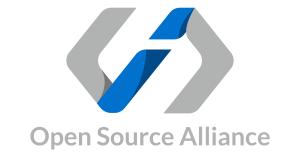Open Source Alliance (OSA): Nominate Leaders for Global AI Governance Convergence Challenge at AI Action Summit
Seeking standard-bearers to preserve Open Source integrity, steer its evolution in a data-driven world, and safeguard digital sovereignty in the AI age.
Open Source Under Threat
The Open Source movement has been a driving force for innovation for over 25 years, supporting an industry valued at approximately $30 billion today and projected to grow to $80 billion by 2030. Open Source software is foundational to modern technology, supporting approximately $8.8 trillion of economic activity annually, with 97% of applications incorporating its code and 9 out of 10 enterprises relying on it to drive their operations.
However, as AI systems reshape every facet of our society, the core principles of Open Source are under unprecedented strain from internal and external forces. Since its 1998 release, data has tested the boundaries of the Open Source Definition (OSD), which is proven on openness but lacking on completeness beyond source code components. Cloud computing has further exacerbated the situation, delivering software as a service without triggering licenses by conveying it as a product. This founding document nonetheless serves as a crucial litmus test for distinguishing Open Source from more proprietary software, giving users a clear and dependable demarcation point on the spectrum of openness.
Recent misuse of the term "Open Source” by commercial AI vendors has further complicated the landscape. For example, models better described as "Open Weight" may lack the expected freedoms to use, study, modify, and share, as they fail to deliver the required components for reproducibility, or are released under non-compliant proprietary licenses. Such practices further dilute the meaning of Open Source and put its transformative potential in jeopardy.
Open Source 2.0: A New Vision for the Future
Despite 10 revisions in its first decade, the Open Source Definition has stagnated at version 1.9 since 2007. Attempts to 'fix' the issues by creating new and conflicting definitions, rather than reinforcing and once again refining the existing standard, risk undermining the clarity and coherence that have made Open Source so impactful.
The Open Source Alliance will address these challenges by embracing a servant-leadership model, empowering participants to guide its evolution collaboratively. Rather than adopting a top-down umbrella structure, the OSA will seek global consensus on Open Source policies from competent authorities, ensuring that they remain resilient and relevant in a rapidly changing technological landscape. Having stabilised the OSD as the canonical definition for Open Source by distributing it among standard-bearers, the OSA will look to the future: Open Source 2.0.
How to Nominate
The Open Source Alliance is inviting both third-party and self-nominations for standard-bearers, encouraging anyone aware of leaders—whether individuals, communities, organisations, projects, or government departments—actively shaping the future of Open Source to nominate them. These standard-bearers will:
- Champion Open Source Values: Advocate for the principles of Open Source in their local contexts, ensuring alignment with national languages and legal frameworks while upholding the universal freedoms to use, study, modify, and share.
- Shape the Future of Open Source: Actively participate in the process of building clear consensus on evolving Open Source policies and practices, ensuring the interests of the groups they represent are well-articulated and reflected.
- Maintain Accessibility: Ensure the Open Source Definition is always available to their audience in a form aligned with their national languages and legal systems.
- Engage Actively: Dedicate themselves to the topic of Open Source, shaping its future in meaningful and impactful ways.
Visit the Open Source Alliance website to submit the nomination form. Nominations are open until Sunday, January 12, 2025.
Quotes
The following quotes can be attributed to Sam Johnston, Convenor, Open Source Alliance (OSA):
"The Open Source movement was born from collaboration without borders. As AI transforms our world, Open Source must evolve to reflect the global and interconnected nature of technology. The Open Source Alliance is about creating a global governance model that gives every nation and stakeholder a voice."
“AI has exposed cracks in the foundation of Open Source. From the misuse of the term by vendors to the failure to include data in our definitions, these are issues we can no longer ignore. The Open Source Alliance will unify efforts to address these challenges with clarity and purpose.”
“Digital sovereignty isn’t just about technology; it’s about autonomy and equity. By empowering nations and communities through Open Source, we ensure a future where technology is a tool for freedom, not dependence.”
"We are proud to be winners of the 'AI Convergence' challenges and to be among the 35 projects supported by the State via France2030 as part of the AI action Summit!"
About the Open Source Alliance (OSA):
The Open Source Alliance is an official AI Convergence Challenge under the Global AI Governance priority theme at the AI Action Summit to be held in Paris on 10-11 February 2025. The aim of this track is to shape an effective and inclusive framework of international governance for Al, building on the work conducted within the United Nations and on existing initiatives like the Global Partnership on Artificial Intelligence.
Dedicated to preserving the enduring relevance of Open Source in the data-driven era, the Open Source Alliance works to uphold the principles of freedom to use, study, modify, and share code and data. By ushering in an era of global governance, aligning with national languages and laws, and addressing modern technological needs, the Open Source Alliance ensures Open Source remains a driver of innovation and enabler of digital sovereignty.
Sam Johnston
Open Source Alliance (OSA)
+1 888-707-6736
email us here
Visit us on social media:
Facebook
X
LinkedIn
Instagram
Legal Disclaimer:
EIN Presswire provides this news content "as is" without warranty of any kind. We do not accept any responsibility or liability for the accuracy, content, images, videos, licenses, completeness, legality, or reliability of the information contained in this article. If you have any complaints or copyright issues related to this article, kindly contact the author above.


